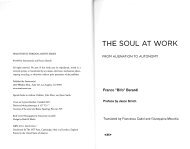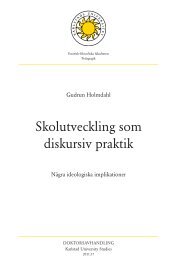FULLTEXT01
FULLTEXT01
FULLTEXT01
Create successful ePaper yourself
Turn your PDF publications into a flip-book with our unique Google optimized e-Paper software.
it occurs, that is, in the discursive practice (Billig, 2005; Wetherell & Potter,1992) and I see school development as a discursive practice well worthexploring in this regard.PurposeIn conclusion, school development in this thesis serves as a kind of entranceand a general description for the starting point of the empirical material. Theanalysis focuses on how discourses are established and made valid in such adiscursive practice and how this can be interpreted in terms of what is alreadyavailable. Thus the aim is to highlight the ideological implications of schooldevelopment as a discursive practice. More comprehensively the aim is alsocontributing to altered locations and to shifts in perspective according to schooldevelopment.Theoretical framework, research design and analytical conceptsThe concept of discourse, as applied in this thesis, can be linked to what isusually called „the linguistic turn‟, which can be associated with social scienceresearch from the 1950s onwards and is about redefinition of the meaning oflanguage. The type of „ideology analysis‟ which this study includes, is influencedby different traditions within the field of discourse analysis and is thereforeeclectic to its approach. It refers to Foucault‟s well recognized abstract conceptof discourse as well as to Laclau and Mouffe‟s inclusive concept of discourse.„Rhetorical analysis of arguments‟ with features of conversation analysis andethno-methodological influences (Billig, 2005) is also part of this kind ofideology analysis. The procedure relies on a revised form of ideology analysis ofwhich Wetherell and Potter (1992) provide an example in their study, Mappingthe Language of Racism. Discourse and legitimation of exploitation. Wetherell and Potterdescribe the approach in that study as „a shift from the study of ideology per seto the study of ideological practice and ideological outcomes‟ (Wetherell &Potter, 1992, p.70), something I have chosen to interpret as a preface of anideology analysis instead of an ideology-critical analysis.The design of the study lies in the field of discourse research and morespecifically within critical discursive psychology. Critical discursive psychologydraws on both a post-structural and postmodern conception of discourse. Thestarting point is a perception that certain issues and topics of e.g. conversation,172






